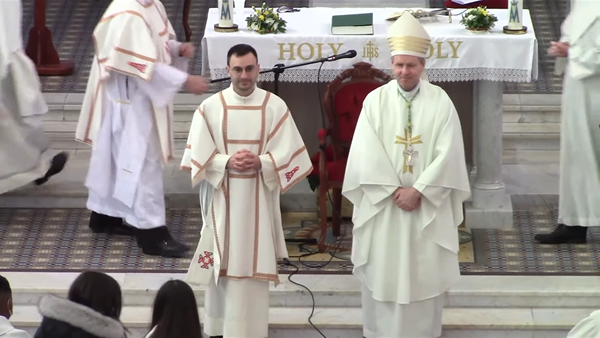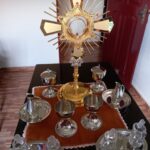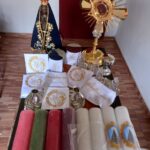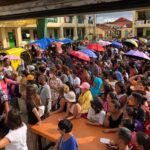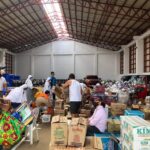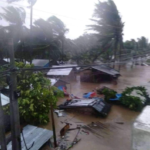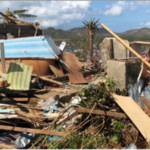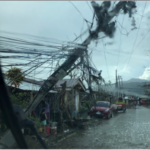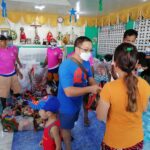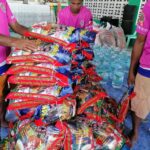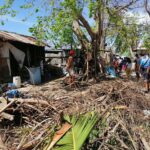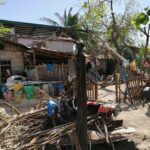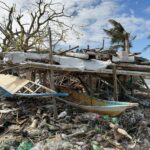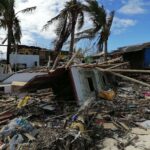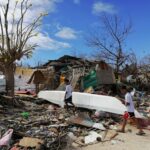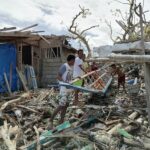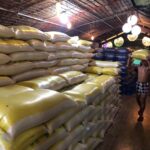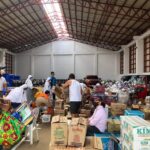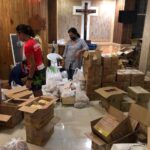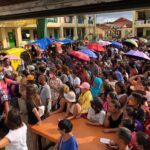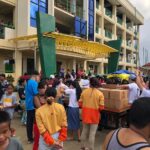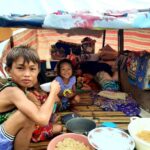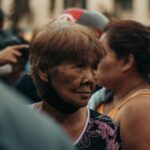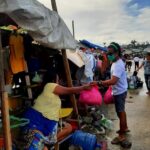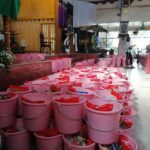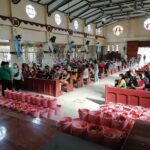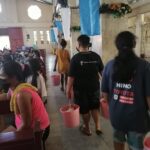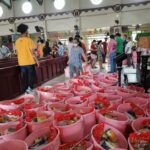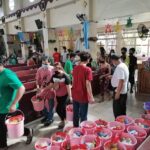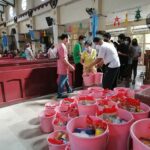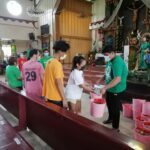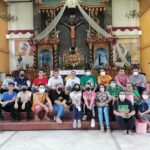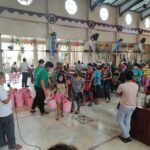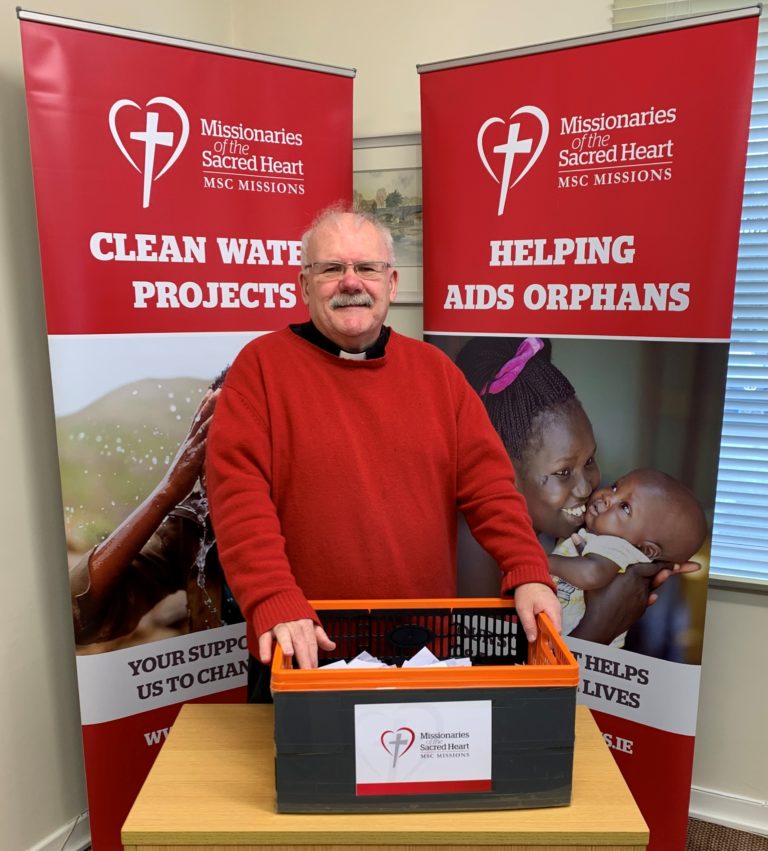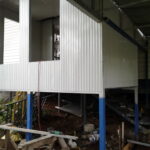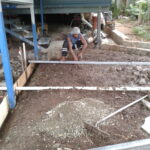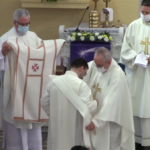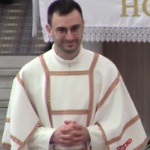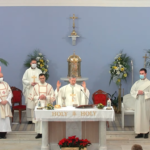OLSH Sisters worship with remote communities in Brazil
OLSH Sisters in Mirinzal, in northern Brazil, minister to local communities across the region in a variety of roles. The parish here is responsible for 18 small chapels, where people can meet, worship, and pray together. These chapels are located in extremely remote rural areas; the state of the roads and a lack of funds for safe transport means that transport is difficult, and attending Mass at these small local chapels is one of very few ways in which these communities are brought together in person.
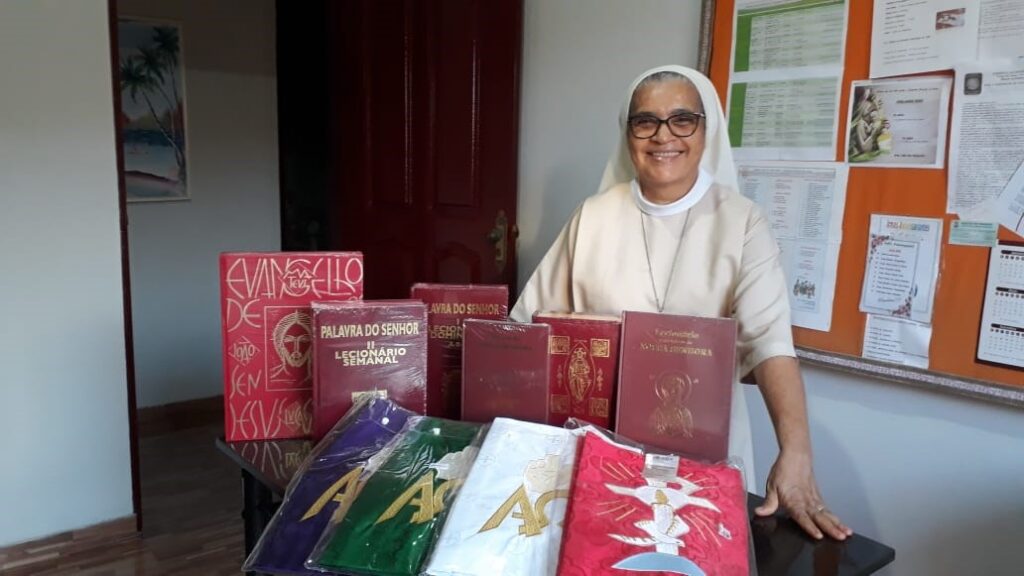
This opportunity to pray and worship together offers a valuable sense of unity and community in regions where many families and individuals find themselves sadly isolated due to a combination of their rural location and poverty. Keeping this sense of togetherness alive is vital and brings a lifeblood to these regions, where it would be very easy for struggling families to fall off the radar entirely.
Last year, as part of our 2021 MSC World Projects Appeal, the OLSH Sisters in Mirinzal appealed to our mission friends here in the Irish Province to help to buy essential liturgical items for Mass, such as missals, chalices, and lectionaries, for three of the 18 mission stations in the region. The funds raised as a result of the generosity of our mission friends here facilitated the purchase of the liturgical items needed for families and individuals across these mission stations to continue to join together in faith and celebrate Mass in their spiritual communities.
- Thanks to the generosity of our mission friends here in the Irish Province following our 2021 MSC World Projects Appeal, OLSH Sisters in Mirinzal were able to to buy essential liturgical items for Mass, such as missals, chalices, and lectionaries, for three of the 18 mission stations they serve across northern Brazil. The purchase of these liturgical items allows families and individuals across these remote mission stations to continue to join together in faith and celebrate Mass in their spiritual communities.
- Thanks to the generosity of our mission friends here in the Irish Province following our 2021 MSC World Projects Appeal, OLSH Sisters in Mirinzal were able to to buy essential liturgical items for Mass, such as missals, chalices, and lectionaries, for three of the 18 mission stations they serve across northern Brazil. The purchase of these liturgical items allows families and individuals across these remote mission stations to continue to join together in faith and celebrate Mass in their spiritual communities.
- Thanks to the generosity of our mission friends here in the Irish Province following our 2021 MSC World Projects Appeal, OLSH Sisters in Mirinzal were able to to buy essential liturgical items for Mass, such as missals, chalices, and lectionaries, for three of the 18 mission stations they serve across northern Brazil. The purchase of these liturgical items allows families and individuals across these remote mission stations to continue to join together in faith and celebrate Mass in their spiritual communities.
“The parish communities that were helped in Brazil are very poor,” writes Sr Jenny Christie FDNSC, International Development Officer for the Daughters of Our Lady of the Sacred Heart. “Once again, you have our deep gratitude.”
IF YOU CAN, PLEASE SUPPORT OLSH OUTREACH PROGRAMMES
“React, respond, and rescue”: The MSC Centre for the Poor responds to Typhoon Odette
Fr Richie Gomez MSC, community leader at the MSC Centre for the Poor, located in Butuan, updates us on the current situation in the Philippines in the aftermath of Typhoon Odette, which struck on December 16th, 2021. In a letter to Irish Provincial Superior Fr Carl Tranter MSC, Fr Richie writes of the deep gratitude of the Filipino MSC community for the support of our mission friends in the Irish Province. “I would like to thank you for your untiring support to the Philippine Province,” he writes. “We are your extended arms, feet, mind, and heart in reaching the poor, and now with our typhoon survivors.”
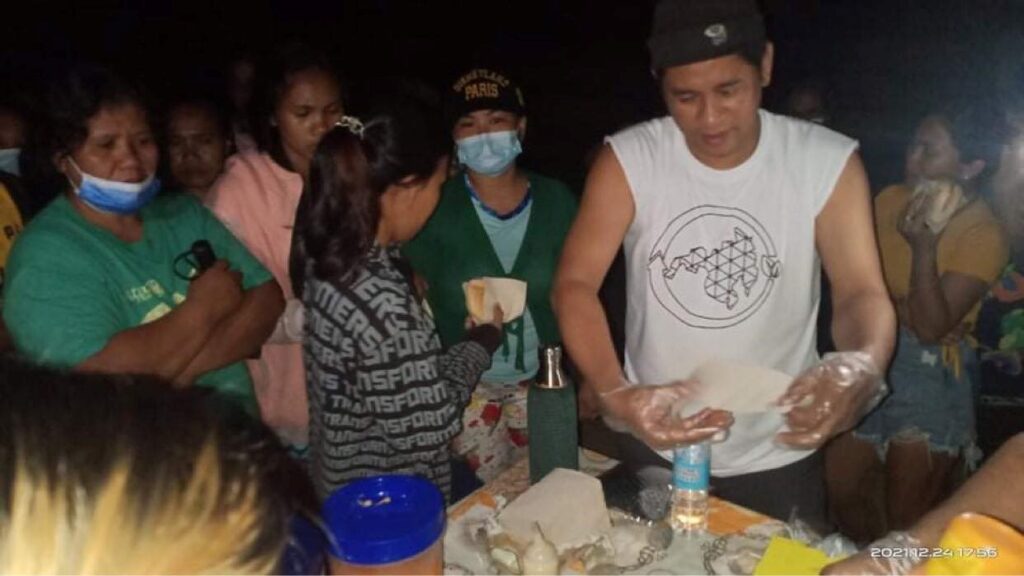
The Missionaries of the Sacred Heart – Social Initiative and Collaborative Action Project (MSC-SICAP) is a group of missionary volunteers “with a charismatic heart,” working as a dedicated disaster response and management team under the umbrella of the MSC Centre of the Poor and led by Fr Richie, the centre’s director.
In response to the devastating impact of Typhoon Odette, Fr Richie has gathered a group of community-based volunteers, including doctors, engineers, teachers, business people, artists, students, and many more. “When it made landfall, winds of up to 210 km per hour were uprooting coconut trees, ripping down electricity poles, and hurling slabs of corrugated tin and wood through the air,” reports the MSC-SICAP group. This group initiated an immediate active response to provide a basic relief kit of necessities including food, water, medicine, and hygiene products, to victims from both the mainland and islands of Surigao. “The group aims to amalgamate passionate and compassionate volunteers in the region, whose hearts are dedicated and committed in the service of humanitarian movements,” writes Fr Richie.
- The Missionaries of the Sacred Heart – Social Initiative and Collaborative Action Project (MSC-SICAP) group, working with the MSC Centre for the Poor, have developed a strategic disaster response plan, detailing three recovery stages for Filipino families in the aftermath of Typhoon Odette.
- The Missionaries of the Sacred Heart – Social Initiative and Collaborative Action Project (MSC-SICAP) group, working with the MSC Centre for the Poor, have developed a strategic disaster response plan, detailing three recovery stages for Filipino families in the aftermath of Typhoon Odette.
- The Missionaries of the Sacred Heart – Social Initiative and Collaborative Action Project (MSC-SICAP) group, working with the MSC Centre for the Poor, have developed a strategic disaster response plan, detailing three recovery stages for Filipino families in the aftermath of Typhoon Odette.
MSC Strategic Disaster Response Plan
The MSC-SICAP group, working with the MSC Centre for the Poor, have developed a strategic disaster response plan, detailing three recovery stages:
Stage 1: Bangon-Igsoon (In the immediate aftermath of the typhoon)
This stage has focused on answering the immediate and urgent needs of survivors, with the distribution of essentials such as food, water, medical aid, and clothes. All of these necessities have been issued directly to victims of the typhoon at designated distribution points, with a target reach of 10,000 households.
Stage 1 also includes the installation of water filtration stations in Siargao Island, which is currently suffering from a dangerous cholera outbreak. These water filtration stations cost 100,000 Philippine pesos, an equivalent of approximately €1,700.
Stage 2: Bahay-Buhay (Approximately one month after the typhoon)
Stage 2 involves helping to build simple houses for families who cannot afford to repair or rebuild homes that have been destroyed by the storm. The target goal is to build 500 houses, benefitting people from the communities of Siargao, Nonoc, Bayagnan, Dinagat, Loreto, and the Islands.
Stage 3: Heal-Surigao (Taking time to heal the island)
During Stage 3, MSCs around the islands will pray with local communities for cleansing and renewal of the land. This stage will also incorporate the arts as a vehicle for healing children and the wider community, through music, dance, storytelling, and more. Through the creative process, it is hoped that children and their families will be able to better process the impact of the typhoon and look with renewed hope towards the future.
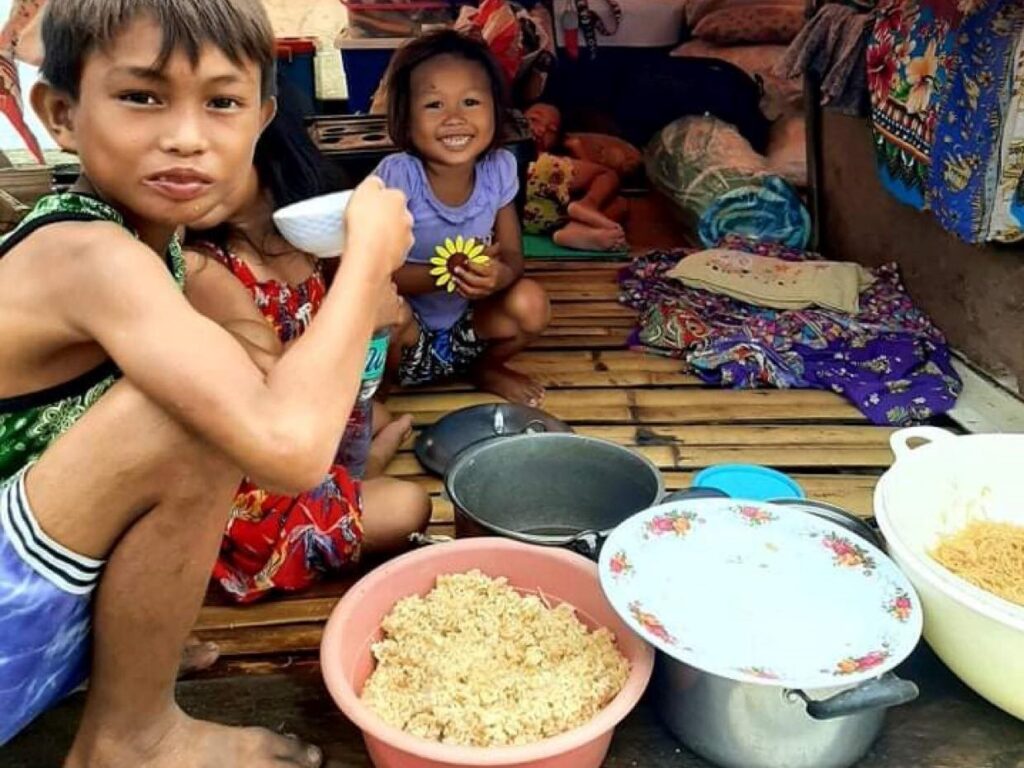
“Faith based, love driven.”
The motto for the response plan is “Faith based, love driven”, as MSCs throughout affected areas work together with local communities to rebuild a ravaged land. The MSC-SICAP group are working to “react, respond, and rescue” the victims of natural disasters such as Typhoon Odette, providing fundamental needs, from the physical to the spiritual, and bringing the light of hope into the hearts of survivors.
As they continue in the implementation of their response plan, the MSC-SICAP group write of the impact of Typhoon Odette, and the power of faith and unity in the hope of renewal:
“‘Expect the unexpected’ – a classic line that could somehow happen to anybody at any moment in any place, just like the typhoon, Odette, that wrecked Surigao. It was once a haven of nature’s bounty, with exciting hullabaloo coming from different nationalities. Now, nothing but silence! December 16th 2021 was an unforgettable traumatic moment for every Surigaonon and tourists in the area, along with other areas where the typhoon made landfall. It was a nightmare…
- On December 16th, 2021, Typhoon Odette swept through Surigao. “Strong winds of 165 km/h near the centre, with gusts of up to 205 km/h and central pressure of 950 hPa, swept away houses, buildings, trees, and street posts, leaving the entire place destroyed.”
- On December 16th, 2021, Typhoon Odette swept through Surigao. “Strong winds of 165 km/h near the centre, with gusts of up to 205 km/h and central pressure of 950 hPa, swept away houses, buildings, trees, and street posts, leaving the entire place destroyed.”
- On December 16th, 2021, Typhoon Odette swept through Surigao. “Strong winds of 165 km/h near the centre, with gusts of up to 205 km/h and central pressure of 950 hPa, swept away houses, buildings, trees, and street posts, leaving the entire place destroyed.”
Strong winds of 165 km/h near the centre, with gusts of up to 205 km/h and central pressure of 950 hPa, swept away houses, buildings, trees, and street posts, leaving the entire place destroyed. The roaring storm sounded horrid, bouncing back into each corner, frightening the children, the elders, and the weak, a miserable experience of anxiety and fear. The unthinkable orchestration of chaos, fear, hunger, and hopelessness has savaged and saddened our Surigaonon brethren.
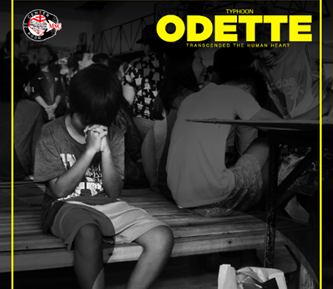
Emotionally, the circumstances have been intensified because it was near Christmas season when the typhoon hit – supposedly a season of merry making and thanksgiving, to celebrate the most awaited Simbang Gabi, but this year, it turned out differently. Many have suffered and been broken, dreams have been shattered, smiles have been torn, and hearts have been wounded. That echoing feeling of devastation resonates in the whole island of Mindanao and to the heart of the world.
They need our HELP! They need our PRAYERS! They need US!
We, the Missionary of the Sacred Heart- Social Initiative and Collaborative Action Project (MSC-SICAP) volunteers, have initiated a massive calamity response from the very start, beginning with providing basic needs to over 5,000 families in several parts of Surigao. The operation runs under our own strategic organising and management system to accelerate the distribution of relief goods with the help of our partners. Hundreds of volunteers convene 24/7 at the district house of the Missionaries of the Sacred Heart in Butuan City, and together we are working hand-in-hand to address the urgent necessities continuously.
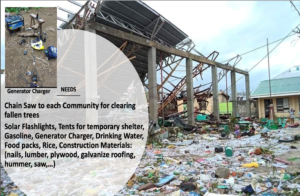
Fr Richie Gomez is the captain of the project and keeps our vessel afloat amidst exhaustion and sleepless nights, for the sake of the wailing sacred land of Surigao that seeks our comfort. We will stand right beside them until they will rise back.
For us, this is an awakening journey and a profound reminder of what our hearts are made of – compassion and kindness. Together, we will rebuild the hopes and dreams of our fellow Surigaonons’ brothers and sisters, and with the provisions of God’s divine grace we shall rejoice back the victory of our loving and united place, Caraga.”
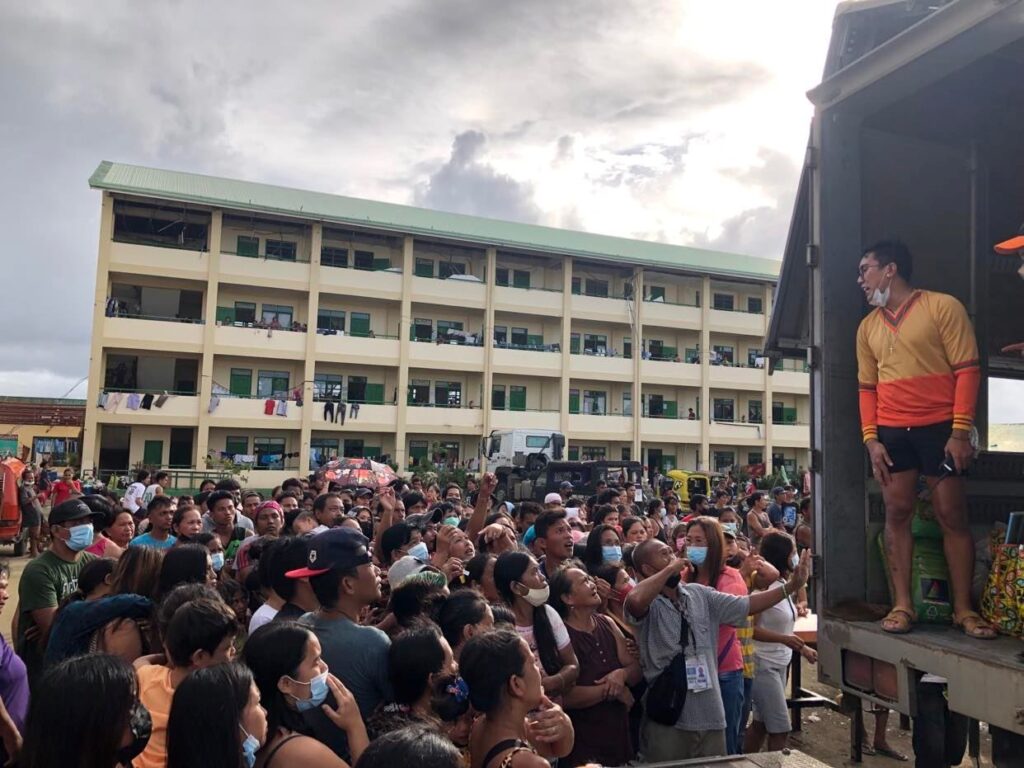
“My eyes have seen the abundance of the wonders of God”: A letter from the Amazon region
Luis Carlos Araújo Moraes MSC is a member of the Brazilian Province of the Missionaries of the Sacred Heart. Recently, he spoke with The Irish Catholic newspaper, sharing his experience as a missionary working in the Amazon region.
The Missionaries of the Sacred Heart (MSC) in Brazil work in parishes on the outskirts of large cities. They attend to the human needs of people, especially the poorest, giving rise to the most diverse humanitarian services: Schools; health care for the poorest; care for abandoned children and adolescents, care for people with chemical dependency; psychological care, solidarity service for the hungry, support for institutions that work with homeless people, etc. All these activities are carried out in partnership with lay people and professionals from the most diverse areas.

In 1998, moved by the desire to be the presence of the human Heart of God, the MSC took on a challenging mission in the northern State of Amazonas, in the heart of the Brazilian Amazon Forest. The Brazilian Amazon Region is almost another “Being the Heart of God, in the heart of the Brazilian Amazon” country, with its own characteristics. This demands from the missionaries a deep process of enculturation, of detachment, respect and acceptance of the various indigenous ethnic groups and their languages, as well as their local culture.
We work in the city of São Gabriel da Cachoeira within the Diocese of São Gabriel da Cachoeira, in the State of Amazonas which has a population of 91,148,000, of which 89.3% are Catholic. In this city, nine out of ten inhabitants are indigenous, it being the municipality with the highest predominance of indigenous people in Brazil. Throughout the diocese, there are more than 20 indigenous ethnic groups, with their own languages and cultures. In addition to the Portuguese language, there are 4 official indigenous languages: Tukano, Baniwa, Nhengatu and Yanomami. Evangelizing, respecting all this cultural and linguistic diversity is a great challenge! Another major challenge is the geographical distances between communities. To reach these communities the only means of transport are small boats which means these visits take place less frequently than desired. We make four visits a year. These communities are no longer completely isolated from urban life. However, many indigenous people speak the languages of t heir ethnic groups as well as Portuguese.
Challenge
Cultural shock is also a challenge: how to keep the original cultures, with their traditions, customs, and values, in the face of the Western culture, experienced in cities? The tendency is to lose one’s own identity, in order to be able to insert oneself into the global culture. It is worth mentioning that the original process of evangelization of indigenous people, prohibited the experience of local culture with their customs. Today, the Church seeks to rescue, the culture of indigenous people, which has been practically destroyed by herself. And finally, there is a lack of vocations and missionaries willing to come to work in this region of Brazil. There are few native priests. Most priests in the diocese come from other regions of Brazil and here they remain only for a period.
After more than 6 months on this mission my eyes have seen, on the one hand, the abundance of the wonders of God, present in the indescribable beauty of forests and rivers, as well as the different indigenous ethnic groups. On the other hand, I have seen sad smiles which hid deep sufferings. I have seen misery and abandonment of the elderly. I have seen and continue to see men and women lying on the corners, as a result of the high rate of alcoholism, which is destroying families and causing domestic violence, especially against women and the elderly.
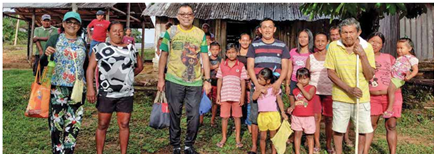
I’ve heard the laments of the people, who forced to leave their homes are thrown into an urban life style, out of their native environment, their mother tongues, and are now living in a city system that exploits them and leaves them with no possibility of developing, because it treats them as “easy prey”, for greedy investments, especially the sale of alcoholic beverages. I also heard reports of violence and sexual exploitation of women, especially adolescents.
Faced with all this, I feel sadness, impotence and indignation, to see how the colonial and consumerist mentality from the outside, marginalizes and enslaves those who had lived in harmony with nature. On the other hand, I continue to feel the joy, of being able to come into contact with the beauty and richness of ethnic groups, with their various languages, their cultures, their food customs and their simple and detached way of living; I feel compassion and mercy and a strong appeal to personal conversion.
Synod
After the Synod of the Amazon Pope Francis wrote:
“I dream of an Amazon that fights for the rights of the poorest, of the native peoples, of the latter, so that their voice may be heard and that their dignity may be promoted. I dream of an Amazon that preserves the cultural richness that characterizes it and in which human beauty shines so differently. I dream of an Amazon that zealously safeguards the seductive natural beauty that adorns it, the overflowing life that fills its rivers and forests. I dream of Christian communities capable of devoting themselves and incarnating themselves in the Amazon, to the point that they give the Church new faces with Amazonian traits” (Post-Synodal Apostolic Exhortation – Dear Amazonia, n. 7).
You may ask yourselves: What do the MSC accomplish in this Amazon mission? We do our best to “Be the presence of God” who loved humankind with a human heart. Whenever we can do nothing to change the reality, let us be present!
 May we Missionaries of the Sacred Heart be the presence of tenderness, compassion, and meekness of the Heart of God for the Amazonian people!
May we Missionaries of the Sacred Heart be the presence of tenderness, compassion, and meekness of the Heart of God for the Amazonian people!
“Beloved be everywhere the Sacred Heart of Jesus, forever!”
Originally published with images in The Irish Catholic on October 21st, 2021.
*
Educating the children of Yetsi: A letter from the Democratic Republic of Congo
Over the Christmas period, we were delighted to receive blessings of the season along with a news update from Bishop Toussaint Iluku Bolumbu MSC, who was ordained bishop of the diocese of Bokungu-Ikela in the Democratic Republic of Congo in July 2019, and who has been working since to improve desperately needed educational facilities in the diocese.
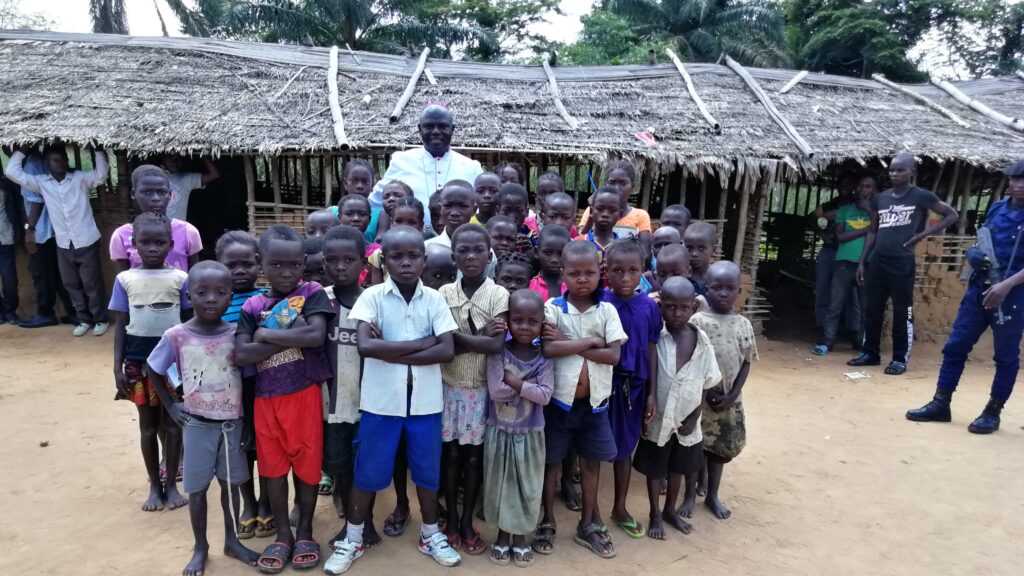
Previously named superior of the Missionaries of the Sacred Heart for the French-speaking African region, Bishop Toussaint is the first MSC African bishop. The diocese of Bokungu-Ikela, located in North West of the Democratic Republic of Congo, was founded by the Missionaries of the Sacred Heart in 1961. Covering an area of 42,000 km, the population of the diocese is estimated at 620,000, and a small clergy of 24 priests, incorporating three MSC communities, have been ministering to the 15 parishes in the diocese for over 60 years.
The Democratic Republic of Congo is ranked as one of the poorest countries in Africa, and the majority of parishes in the diocese of Bokungu-Ikela are located in extremely isolated areas, where transport is difficult as the roads are in a severe state of disrepair. Living conditions are tremendously difficult for local people, who largely depend on agriculture and livestock for their livelihoods, and who struggle terribly with poverty.
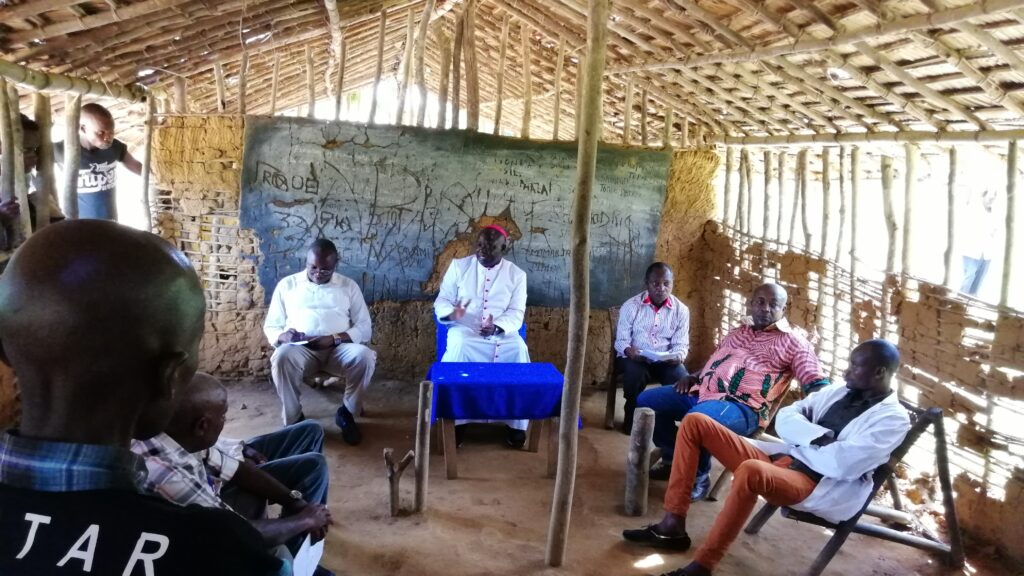
Since 2020, Bishop Toussaint has been fundraising and working to build a new school in the Yetsi region, with mission friends and benefactors here in the Irish Province lending their support through our MSC World Projects Appeals in 2020 and 2021.
Thanks to the generosity of our mission friends here in the Irish Province following our 2020 appeal, Bishop Toussaint and his team were able to begin funding the initial stages of the construction of a school building in Yetsi. With the help of our 2021 appeal, Bishop Toussaint and the MSC team were able to buy essential basic equipment such as benches and tables. Prior to this, many children spent classes sitting on the floor. “Some of the pupils bring their own chairs from their homes,” Bishop Toussaint wrote at the time. “However, many of these children are from homes that have so little, they don’t even have a chair to bring to school. Those children who don’t have them, they have the floor, where they sit down and follow the teacher.”
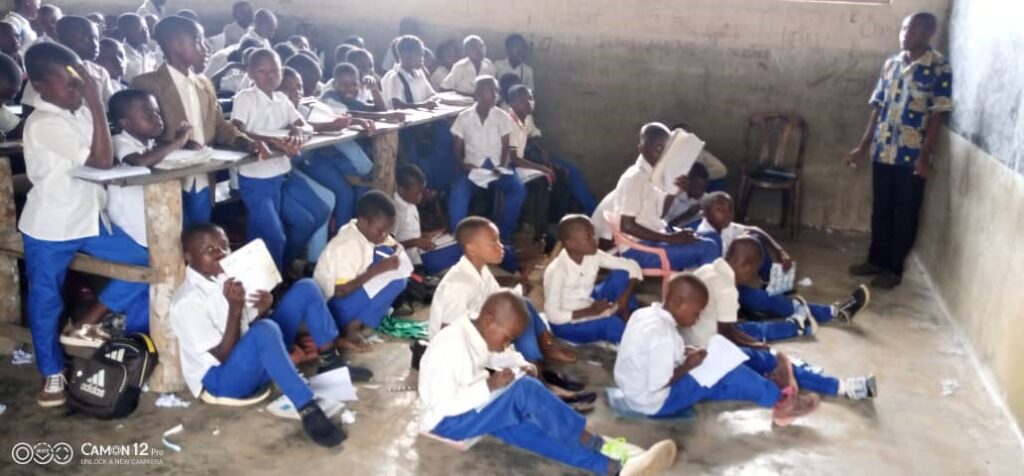
This Christmas, Bishop Toussaint writes with news of further developments in the ongoing construction of the Yetsi school, as the MSC community there continue to work towards giving local children the education they need.
“Greetings from our deepest forest centre, Bokungu,” writes Bishop Toussaint. “I wish you a Merry Christmas and a Happy New Year, full of the blessings of the Lord.”
“We have been collecting local material for the Yetsi school construction, and the boat we have been waiting for, for so long, finally is close to arriving in Bokungu. Cement, sheet metals (plates), and iron bars will finally reach us here. It is my duty to build a good school for our pupils there. Thank you so much for your support and please keep in your prayers an intention for Bokungu-Ikela, a rural diocese full of challenges.”
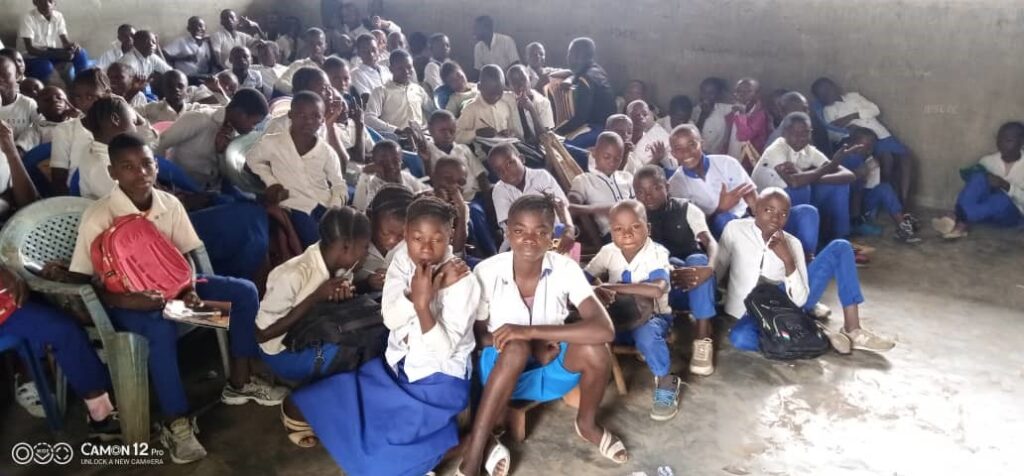
In a Christmas letter, Bishop Toussaint writes, “While all humanity is facing multiple challenges and fears, the Lord opens before us, through the birth of his beloved Son, Emmanuel, a path of light and life, of hope and love. It is with the Prince of Peace that we can say to all of you: ‘Trust, do not be afraid’. (Mk 6:50).”
“I express my deep gratitude to you and to the Promotion Office for the support to our Diocese. May the Lord bless you.”
With the Catholic Church being one of the main sources of hope for struggling families in the region, Bishop Toussaint and our MSCs continue to do their best to lay the groundwork to give local children, and generations to come, vital resources in education and with it, hope for the future.
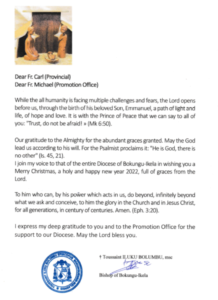
MSC relief outreach continues in the Philippines in the wake of Typhoon Odette
As relief efforts continue in the Philippines following the devastating impact of Typhoon Odette in December 2021, MSC Mission response programmes are ongoing.
- MSC mission response efforts in Guilutongan Island, Cordova, which is one of the most affected communities in Cebu following the impact of Typhoon Odette. (Image via @mscmissionphil on Facebook.)
- MSC mission response efforts in Guilutongan Island, Cordova, which is one of the most affected communities in Cebu following the impact of Typhoon Odette. (Image via @mscmissionphil on Facebook.)
- MSC mission response efforts in Guilutongan Island, Cordova, which is one of the most affected communities in Cebu following the impact of Typhoon Odette. (Image via @mscmissionphil on Facebook.)
On January 11th, the MSC Mission Office in the Philippines reported that relief outreach to date has been far-reaching, with 3,791 relief packs, 575 sacks of rice, and 730 gallons of water distributed since the typhoon hit in mid-December, killing over 400 and rendering hundreds of thousands of people homeless.
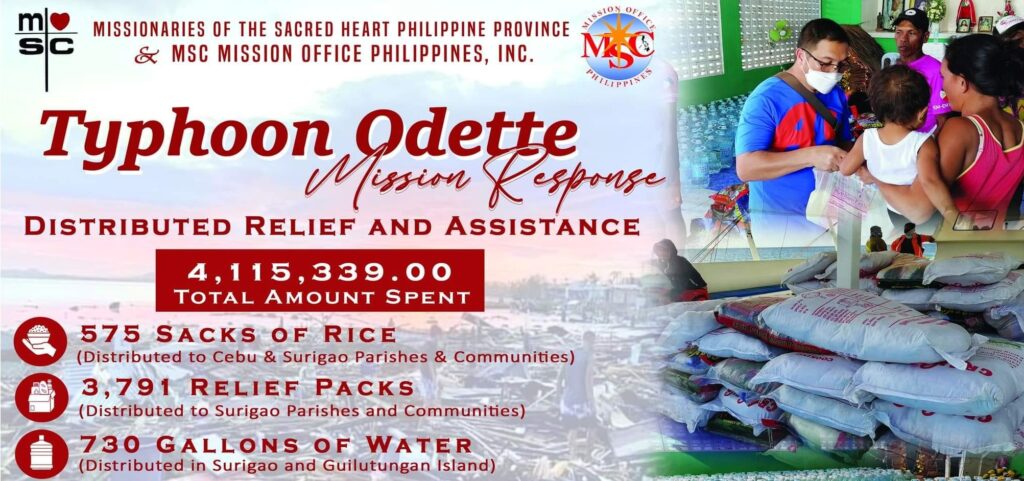
The Facebook page for the MSC Mission Office in the Philippines shared a collection of photographs of the relief distribution programme based in Guilutongan Island, Cordova, which is one of the most affected communities in Cebu. These images give just some indication of the sheer scale of the damage done by Typhoon Odette as it tore through the country, leaving close to 600,000 people without homes.
- Just some of the damage caused by Typhoon Odette in Guilutongan Island, Cordova. Almost 600,000 people were displaced from their homes following the impact of the typhoon in December 2021. (Images via @mscmissionphil on Facebook.)
- Just some of the damage caused by Typhoon Odette in Guilutongan Island, Cordova. Almost 600,000 people were displaced from their homes following the impact of the typhoon in December 2021. (Images via @mscmissionphil on Facebook.)
- Just some of the damage caused by Typhoon Odette in Guilutongan Island, Cordova. Almost 600,000 people were displaced from their homes following the impact of the typhoon in December 2021. (Images via @mscmissionphil on Facebook.)
- Just some of the damage caused by Typhoon Odette in Guilutongan Island, Cordova. Almost 600,000 people were displaced from their homes following the impact of the typhoon in December 2021. (Images via @mscmissionphil on Facebook.)
- Just some of the damage caused by Typhoon Odette in Guilutongan Island, Cordova. Almost 600,000 people were displaced from their homes following the impact of the typhoon in December 2021. (Images via @mscmissionphil on Facebook.)
- Just some of the damage caused by Typhoon Odette in Guilutongan Island, Cordova. Almost 600,000 people were displaced from their homes following the impact of the typhoon in December 2021. (Images via @mscmissionphil on Facebook.)
Writing from an evacuation centre on Christmas Eve, community leader Fr Richie Gomez MSC told Irish Provincial Superior Fr Carl Tranter MSC how grateful he was for the “overwhelming support” that our Filipino MSC brothers have received from the Irish Province of the Missionaries of the Sacred Heart. We ask that your continue to keep our MSC brothers and the people of the Philippines in your prayers as they continue to navigate this landscape of loss and destruction.
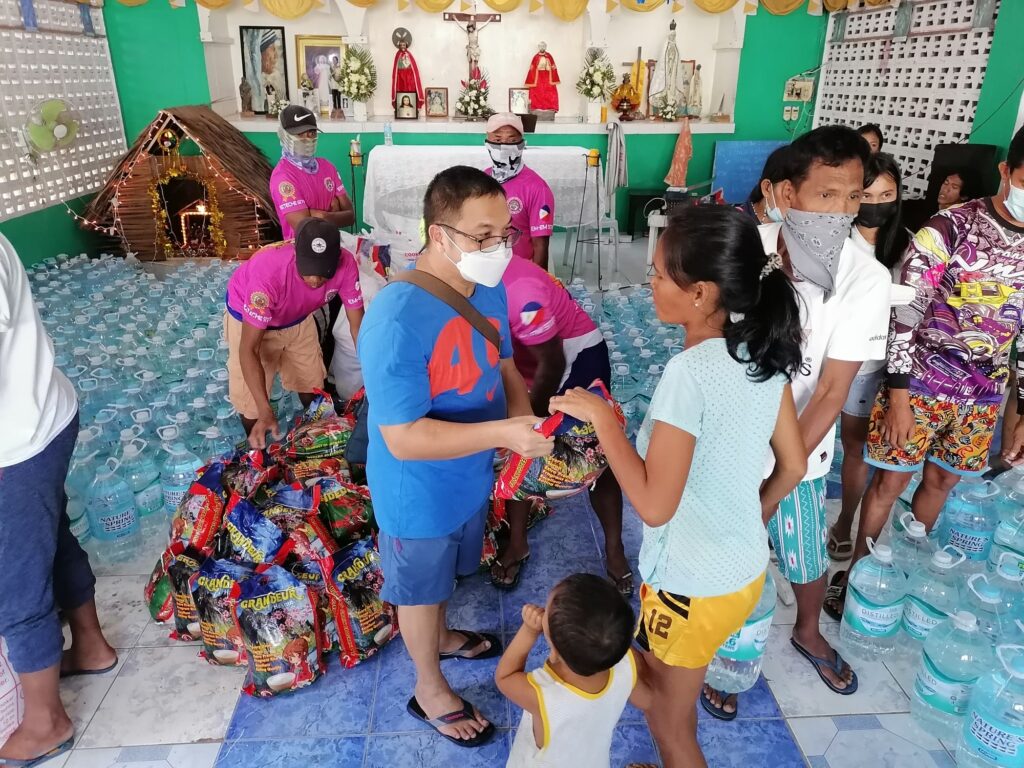
Images via the MSC Mission Office Philippines, Inc. Facebook page.
*
Fr Alan in South Sudan: Christmas in South Sudan
“It’s a big shift coming back to South Sudan again. After a few weeks at home in November, sporting a woolly hat, gloves, and my scarf, I’m now back in my shorts and light shirts. All this week the temperature is around the 38C mark, and it isn’t even the hottest time of the year! Still, it’s good to be in Loreto again.
The exams are over and the term has come to an end, so most of the students headed off for the holidays. We only have a small group who either live far away or would be in danger of forced marriage if they went home. It’s quieter around the campus, but there is always something happening. We have already gone on a few day trips to nearby parishes. The rains finished earlier than last year, so the roads are passable, but very dusty. So far, we have taken the students to the parish of Cueibet, which is under the care of Korean, Peruvian, and Egyptian missionaries, and Wulu, where a Spiritan missionary is parish priest. In each place the Church is actively involved in the local community, supporting education through schools, running agricultural projects, working in the hospitals, and of course celebrating the Sacraments with the people.
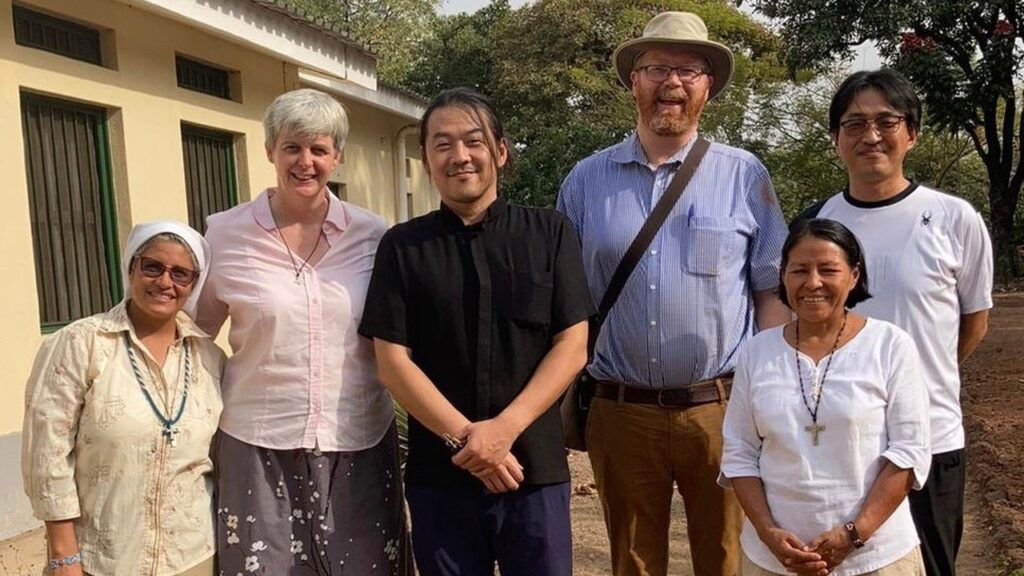
Christmas Mass for us would normally happen in our usual spot under the neem trees next to the school, but one of the priests in town who was at home for holidays was diagnosed with COVID, so we agreed to help out in his parish. Our Christmas vigil and morning Mass were both special celebrations, with families gathering together to welcome the birth of Jesus once again. As Pope Francis said this year, “Jesus is the name and the face of love – this is the foundation of our joy”. There was no shortage of joy as the people sang, danced, and prayed in thanksgiving for the birth of our Saviour.
Our own Christmas dinner was a wonderful affair. Like any family we set out the extra tables and twenty-two of us shared a dinner of goat, sikumawiki (sort of like spinach, but not really), chapati, Irish potatoes (that’s what the locals call them), and tamalaka (a peanut sauce), all made by the students. Nothing is wasted when cooking here. I still haven’t worked my way up to tripe yet. One day maybe, but not this year!
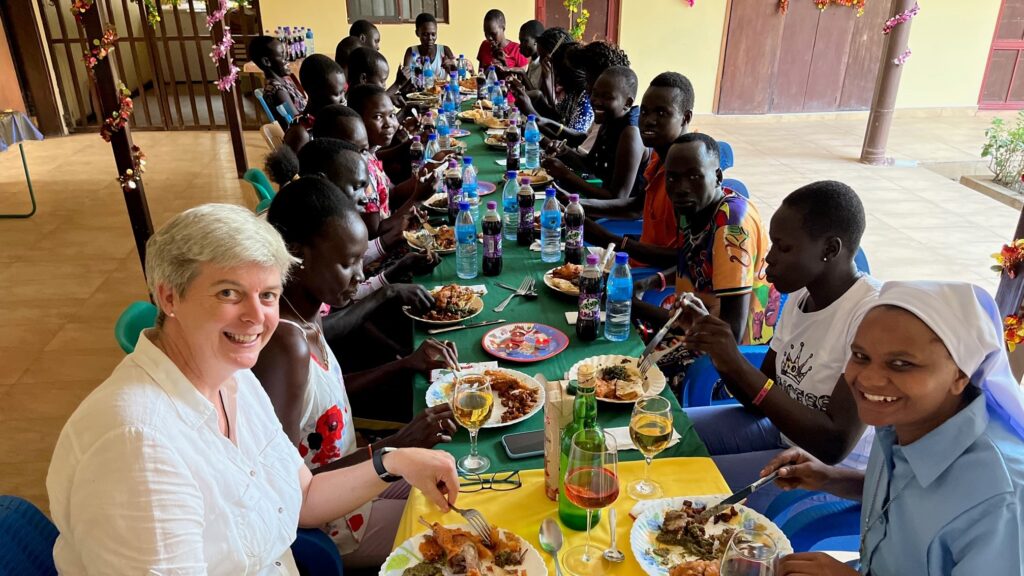
The Feast of the Holy Family fell on the 26th, and according to tradition here, that is the main day to baptise children. Normally, four baptisms at any liturgy is more than enough for me, but here we had twenty-two. It was chaotic as you might expect at times, but it was a holy chaos, and the babies were just beautiful. People here cannot afford mobile phones, so cameras going off non-stop was not an issue. The baptisms took place within Mass, so the whole affair took two hours. By the end, I was ready for a cuppa, but the babies were probably the quietest there, content in their mothers’ arms. Another unique tradition they have there is to place a tinsel garland on the priest mid-baptism, so while I was busy anointing, I was being festooned like the prize bull at a cattle show.
!["[One] unique tradition they have there is to place a tinsel garland on the priest mid-baptism, so while I was busy anointing, I was being festooned like the prize bull at a cattle show." ~ Fr Alan recalls baptising twenty-two babies, in keeping with local tradition, on the Feast of the Holy Family on December 26th. "[One] unique tradition they have there is to place a tinsel garland on the priest mid-baptism, so while I was busy anointing, I was being festooned like the prize bull at a cattle show." ~ Fr Alan recalls baptising twenty-two babies, in keeping with local tradition, on the Feast of the Holy Family on December 26th.](https://www.mscmissions.ie/wp-content/uploads/2022/01/FrAlan_December2021_2-Copy-1024x577.jpg)
As I write this on New Year’s Eve, I look forward to tonight, when we will have a New Year vigil for the Feast of Mary, Mother of God. Previously, people would be wary of being out after dark, because of persistent security problems. Thankfully, this year things are calm and people feel safer. 2021 has certainly been a year of mixed blessings, with more than its fair share of challenges. I think we have all felt a little bit more vulnerable, but perhaps more connected too in spite of our self-isolation. There is no doubt we realise that we are more reliant on each other, and we are conscious that the effects of how we live can impact our brothers and sisters.
This year South Sudan benefitted from global solidarity efforts like the Covax vaccination programme. Loreto as a school has gone from strength to strength. A lot has been achieved, but there is still so much more to do. We have also been impacted by climate change, as rainfalls, which are essential to survival in an agricultural country, are disrupted. People will have to make do with what they harvested and we’ll do our part to help too. As we begin this New Year, let us do so with joy and with hope as well. We remember that God came into our world as a vulnerable child, in the simplest of settings, among a people who were struggling, to remind us He came for all of us and that together we are one family.”
Merry Christmas to you all or as they say here, Miet puou dhith banyda.
Fr Alan
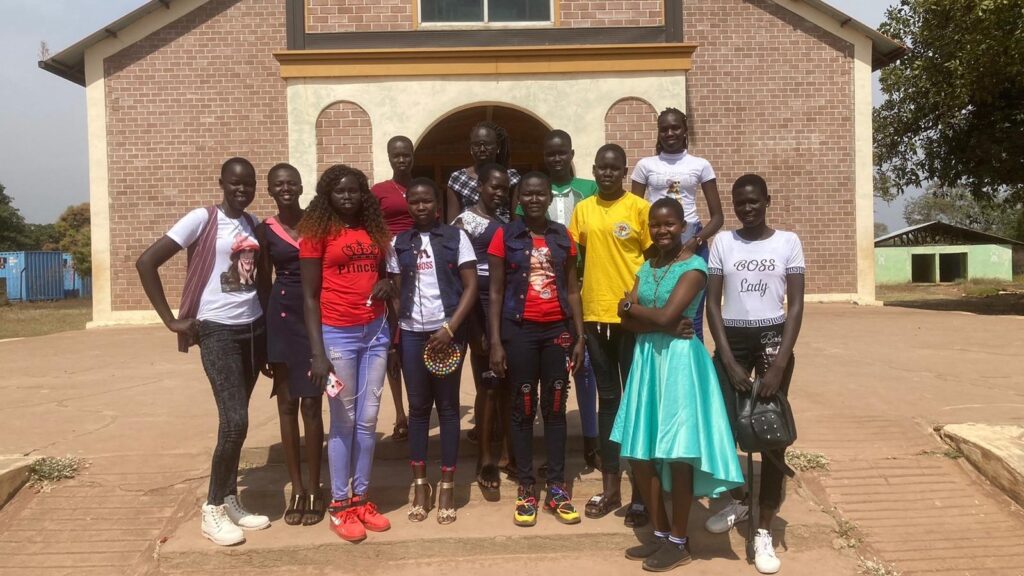
Read more from Fr Alan’s missionary journey in South Sudan:
- Looking for a Sign on the Way to South Sudan
- Building a Better Future in South Sudan
- Christmas Greetings from Fr Alan in South Sudan
- A Cup of Sugar and Maybe a Goat
- Mock Exams and Real Life in South Sudan
- As Easy as Baking a Cake
- Holy Week on the Move
- Three Arrivals and a Party
- Celebrating the Missionary Life
- Seeds of Hope
- Young People Fighting COVID-19 in Rumbek
- Ticket to Ride
- Lions, Snakes, and the World’s Deadliest Predator
- Vaccine Status: Denied
PLEASE HELP US TO TRANSFORM LIVES IN SOUTH SUDAN
Christmas in an evacuation centre: MSCs providing typhoon relief aid in the Philippines
MSCs in the Philippines have been working throughout the Christmas season to bring emergency aid to survivors of Typhoon Odette, which hit the country with devastating consequences on December 16th, 2021.
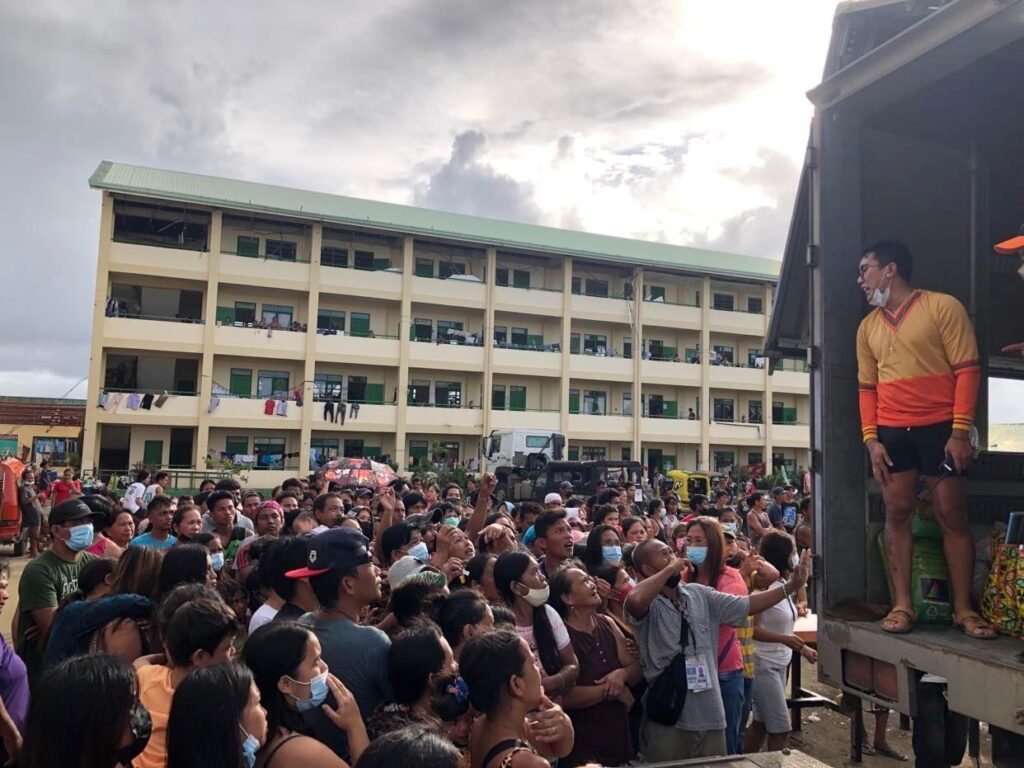
Super Typhoon Rai, known locally as Odette, was the largest storm of 2021, with 6.2 million people affected in ten regions across the country. 580,000 people were displaced by the storm, and the death toll, as of December 30th, was at 397, with many more injuries. Over 712,000 homes have been badly damaged or destroyed by the storm, while an estimated 80,000 hectares of crops and agricultural land have been ravaged by powerful winds and torrential rain.
- The MSC Centre for the Poor, located in Butuan in the south of the Philippines, is providing emergency relief aid for survivors of Typhoon Odette, which hit in December 2021.
- The MSC Centre for the Poor, located in Butuan in the south of the Philippines, is providing emergency relief aid for survivors of Typhoon Odette, which hit in December 2021.
- The MSC Centre for the Poor, located in Butuan in the south of the Philippines, is providing emergency relief aid for survivors of Typhoon Odette, which hit in December 2021.
Our MSC Centre for the Poor, located in Butuan, has been carrying out relief efforts over the Christmas period. Headed by community leader Fr Richie Gomez MSC, the volunteer team have been working to bring vital emergency aid to families and communities in the south of the country.
- MSC relief efforts are ongoing as we work to help Filipino families whose lives and livelihoods have been destroyed by Typhoon Odette.
- MSC relief efforts are ongoing as we work to help Filipino families whose lives and livelihoods have been destroyed by Typhoon Odette.
- MSC relief efforts are ongoing as we work to help Filipino families whose lives and livelihoods have been destroyed by Typhoon Odette.
As of December 30th, it was reported that some 580,000 people had been displaced by the storm, with 356,000 people dependent on the services of evacuation centres, while a further 227,000 were staying with family or friends. Writing from an evacuation centre on Christmas Eve, where he and a group of volunteers were handing out meals to the indigenous Badjao community, who had been “washed out” of their homes on the shoreline, Fr Richie told Irish Provincial Superior Fr Carl Tranter MSC how grateful he was for the “overwhelming support” that our Filipino MSC brothers have received from the Irish Province of the Missionaries of the Sacred Heart.
- On Christmas Eve, Fr Richie Gomez MSC and the MSC Centre for the Poor community provided nutritious meals for the indigenous Badjao community, who had been displaced from the homes by Typhoon Odette.
- On Christmas Eve, Fr Richie Gomez MSC and the MSC Centre for the Poor community provided nutritious meals for the indigenous Badjao community, who had been displaced from the homes by Typhoon Odette.
- On Christmas Eve, Fr Richie Gomez MSC and the MSC Centre for the Poor community provided nutritious meals for the indigenous Badjao community, who had been displaced from the homes by Typhoon Odette.
“It is quite emotional, on my part, celebrating Christmas Eve in evacuation centres, when Jesus became the bread of life, the Emmanuel, for all of us,” wrote Fr Richie.
“I thank God for this great privilege… He has used me on a Christmas Eve to feed hundreds of evacuees with mushroom burgers made by our scholars at the Centre for the Poor.”
“Thank you for your overwhelming support!”
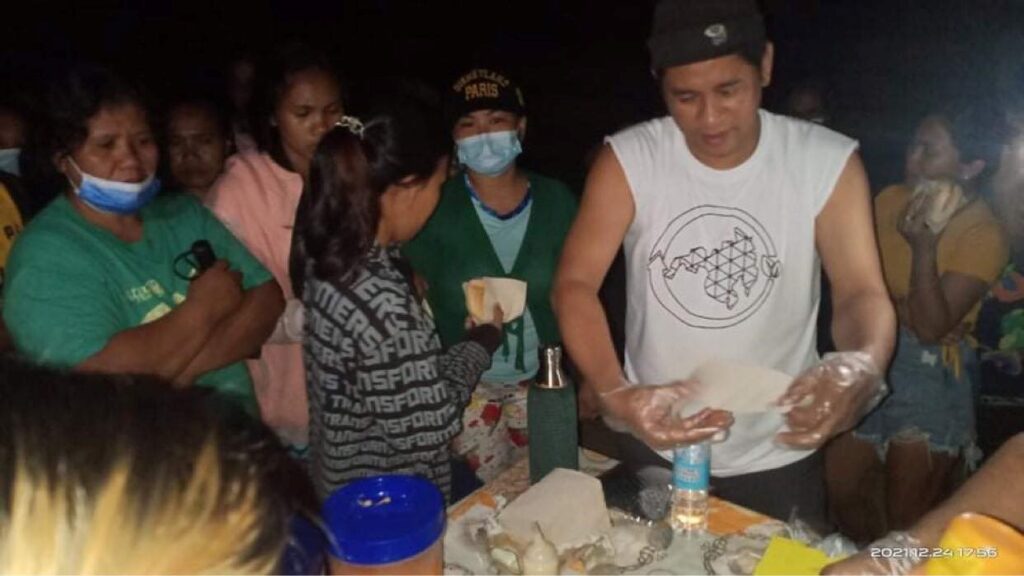
Our MSC brothers and Sacred Heart sisters are working tirelessly to provide essential support to the survivors of the typhoon as clean-up operations continue. We ask that you please keep our Sacred Heart family, and the communities they serve, in your prayers at this time of great need.
*
“Share a Christmas Basket” in the Philippines
On December 22nd, the MSC Missions Office in the Philippines hosted a day of community sharing and togetherness, with the Share a Christmas Basket Project in Sta. Quiteria and St Francis of Asissi Parish Church.
- “Share a Christmas Basket” Project, MSC Missions Office Philippines. (Image via @mscmissionphil on Facebook.)
- “Share a Christmas Basket” Project, MSC Missions Office Philippines. (Image via @mscmissionphil on Facebook.)
- “Share a Christmas Basket” Project, MSC Missions Office Philippines. (Image via @mscmissionphil on Facebook.)
On December 20th, local volunteers worked together to pack hundreds of baskets of food and Christmas provisions in preparation for the programme, which benefitted a total of 1,000 families who received care packages on the day.
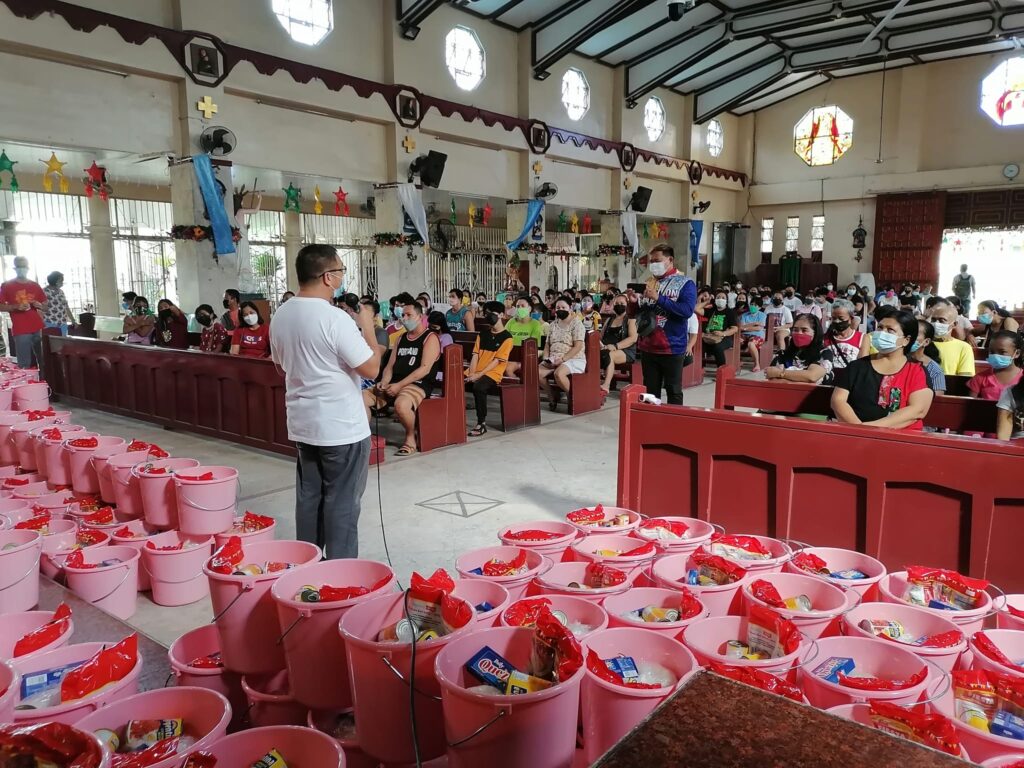
The MSC Mission Office Philippines, Inc. posted their gratitude on their Facebook page:
“On behalf of the beneficiaries, we would like to thank all the donors, the SFSQ Parish who helped us facilitate and organize this activity and to all volunteers who helped us, in one way or another, made this activity possible. To all of you, MARAMING SALAMAT PO!”
- “Share a Christmas Basket” Project, MSC Missions Office Philippines. (Image via @mscmissionphil on Facebook.)
- “Share a Christmas Basket” Project, MSC Missions Office Philippines. (Image via @mscmissionphil on Facebook.)
- “Share a Christmas Basket” Project, MSC Missions Office Philippines. (Image via @mscmissionphil on Facebook.)
MSCs in the Philippines are currently running several emergency response programmes, following the terrible damage caused by Super Typhoon Odette on December 16th. We at the Irish Province of the Missionaries of the Sacred Heart continue to offer our prayers and our support, and with the spirit of Christmas in our hearts, we send every blessing to our MSC brothers in the Philippines and the communities they serve there.
- “Share a Christmas Basket” Project, MSC Missions Office Philippines. (Image via @mscmissionphil on Facebook.)
- “Share a Christmas Basket” Project, MSC Missions Office Philippines. (Image via @mscmissionphil on Facebook.)
- “Share a Christmas Basket” Project, MSC Missions Office Philippines. (Image via @mscmissionphil on Facebook.)
Click here to watch a video of the Share a Christmas Basket Project preparations.
Images via the MSC Mission Office Philippines, Inc. Facebook page.
*
Typhoon Odette hits the Philippines
Super Typhoon Rai, known locally as Odette, hit the Philippines on December 16th, and has proved to be the largest storm of the year to date. Over 300,000 people were evacuated from their homes in anticipation of the typhoon, with 10,000 villages predicated to lie in its path.
Homes, businesses, farms, and livelihoods have been torn to shreds by powerful rain, and winds reaching up to 260 kph/160 mph, with gusts of up to 300 kph/185 mph. While millions have been affected, the full extent of the damage caused by Typhoon Odette is not yet known, as many lines of communication are still down and the immediate focus is on rescuing and caring for those in urgent need. As of Monday, December 20th, the national police service announced that at least 375 people had been killed, with 500 more injured and 56 missing. Trees and buildings have fallen, many areas are badly flooded, roofs have been ripped from houses, and survivors are in urgent need of food and clean drinking water.
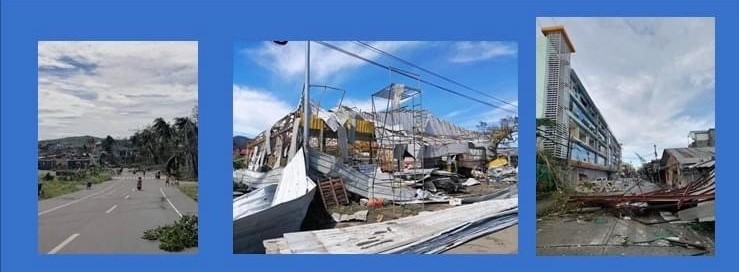
“Please keep the MSC, FDNSC (Daughters of Our Lady of the Sacred Heart), MSC Sisters, and all of the people of the Philippines in your prayers,” wrote Fr Carl Tranter MSC, Irish Provincial Superior.
“The central and southern parts of the country have been badly hit by the very powerful typhoon Odette, which has caused massive destruction.
We are aware of significant damage across our parishes and the schools/clinics of our sisters on Mactan island and Cebu in the central Philippines, and in Surigao and Agusan in the south.
We stand in solidarity with our Chevalier family in the Philippines and with all the Filipino people.”
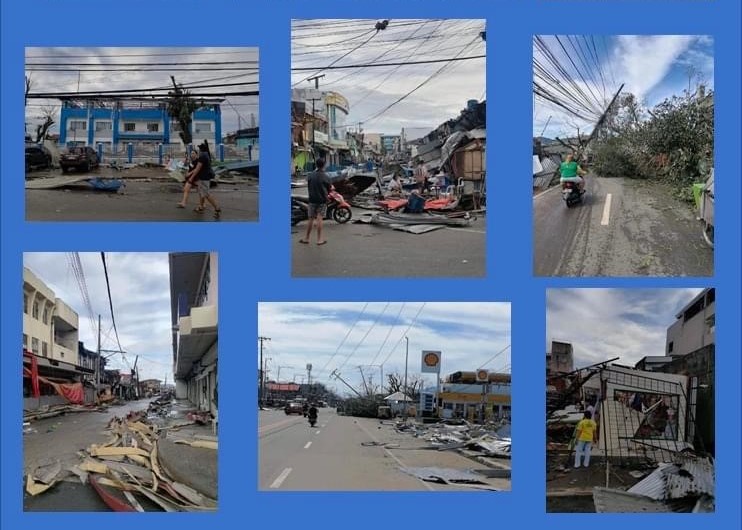
As opportunities for communication are minimal in the wake of the storm, we have yet to understand the full impact of the typhoon on our extended Sacred Heart family in the Philippines. The Irish Province of the Missionaries of the Sacred Heart have sent emergency funds to assist in the immediate aftermath of the storm, as MSC and FDNSC communities undertake the initial clean-up and search and rescue operations. We will continue to provide help as it is needed in the new year, and we ask that you please remember our Sacred Heart family in the Philippines in your prayers in the coming weeks, as they pick up the pieces of lives and livelihoods that have been demolished by this mighty force of nature.
Congratulations to the winners of the 2021 MSC Christmas Raffle!
Building a laundry for the elderly in Papua New Guinea
At the beginning of this year, the community of Daughters of Our Lady of the Sacred Heart in Port Moresby, Papua New Guinea, appealed for our help in funding a laundry for their aged-care ministry as part of our annual MSC World Projects Appeal.
The Hartzer Centre is an aged-care centre attached to the main convent in Port Moresby, the country’s capital, where the Sisters care for elderly OLSH Sisters and MSC missionary priests who have devoted their lives to serving the people of Papua New Guinea. With eight rooms for elderly residents, it was an ongoing concern that the centre did not have a dedicated laundry area of its own, creating difficulties surrounding hygiene as the centre’s nurses would have to bring all dirty laundry through the convent dining room to reach the communal washing area.
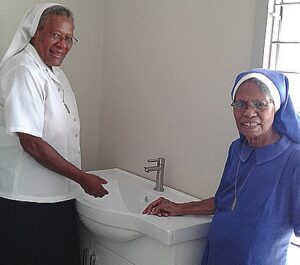
Our mission friends in Ireland and the UK have already helped the OLSH Sisters in Papua New Guinea to provide extra safety measures in the Hartzer Centre, including extra sinks for improved safety in the continuing battle against COVID-19. Now, thanks to the funding sent through our 2021 MSC World Projects Appeal, the new laundry is well underway, despite limitations brought about by the pandemic.
- Construction work is ongoing at the new laundry for the Hartzer Centre in Port Moresby, Papua New Guinea.
- A new laundry will make a great difference to the elderly residents of the OLSH-run Hartzer Centre in Port Moresby, Papua New Guinea.
- A new store room means that the OLSH Sisters at the Hartzer Centre in Port Moresby can easily store wheelchairs and equipment without blocking up the corridors.
This week, we were delighted to hear from Sr Rosaleen, who sent us an update on their current progress:
“Due to COVID restrictions, the laundry is not yet finished, but progress is being made! The maintenance man has been working hard and has built a store room at the level of the corridor into the care centre, so we can store wheelchairs and equipment without having them blocking the corridors.”
“When it is finished, the laundry will be downstairs, with another small store room for things like garden tools, which the centre residents use when they are able to potter in the garden.”
“We are most grateful for the funding and support we have received from friends and benefactors in the Irish Province of the Missionaries of the Sacred Heart, and we thank you very much for your kindness and generosity towards us.”
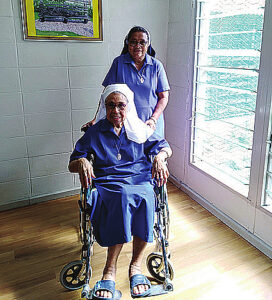
A day of celebration: Congratulations to Giacomo Gelardi MSC on his ordination to the Diaconate
Wednesday, December 8th marked a day of double celebrations for the Irish Province of the Missionaries of the Sacred Heart, and for our extended MSC family around the world, as we celebrated the ordination of Giacomo Gelardi MSC to the Diaconate on the 167th anniversary of the foundation of the Society of the Missionaries of the Sacred Heart.
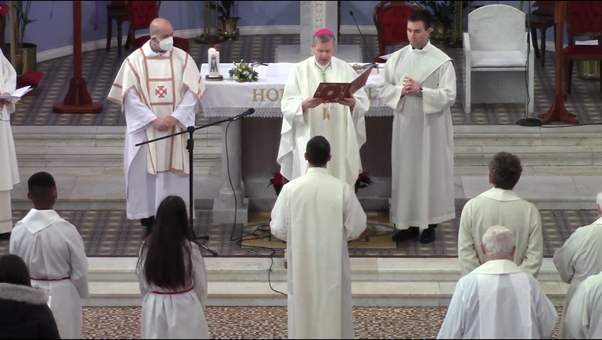
Having made his Perpetual Profession to the Missionaries of the Sacred Heart in September of this year, Giacomo was ordained to the Diaconate by Bishop Fintan Gavin, at the Church of Our Lady and St John in Carrigaline, Co. Cork, on the morning of December 8th, 2021. In the immediate wake of Storm Barra, which had put Co. Cork on a red alert status just the day before, Bishop Fintan Gavin began the ceremony by thanking everyone who had travelled to celebrate this very special day with Giacomo, despite all the challenges the weather had thrown in the way.
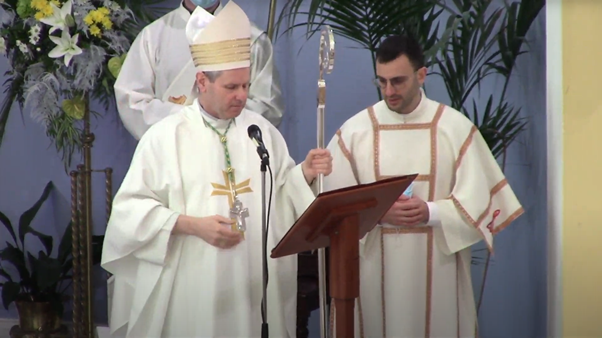
“I feel particularly honoured to be here today ordaining Giacomo,” said Bishop Fintan. “My own connection to the MSCs goes back to the mid-90s, with Fr Pat Duffy and Jim McCormack, when I worked with them in Killinarden. I was always made to feel part of the community, very much welcome. I came to know Giacomo while teaching in Maynooth, and then, through the Italian Chaplaincy in Dublin, where Giacomo not only participated, but he worked with me on the Confirmation programme and the preparation for marriage over one of the years. Today we pray that the Holy Spirit will be with Giacomo, giving him strength and comfort, and that the spirit will accompany him in his witness and service as a Deacon, on his path to priestly ordination.”
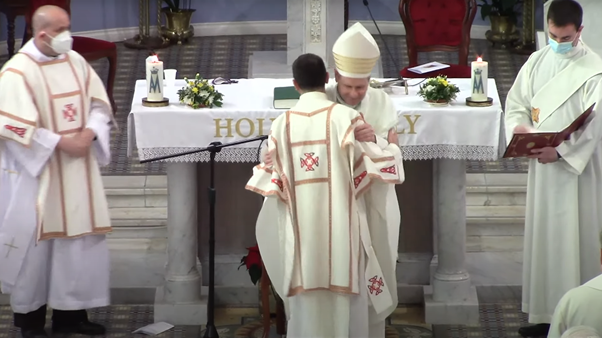
“Giacomo, today we celebrate another very significant moment on your journey to saying yes to God’s plan for your life,” continued Bishop Fintan. “This is a journey that began in your own home with the faith shared by your family and your family community in Urbino; a journey that would take you to World Youth Day in Cologne, that would deepen and mature over the years, through time spent in Verona and York, and discerning eventually a particular call to missionary religious life with the Missionaries of the Sacred Heart, which led to your final profession. Today, we celebrate a further deepening of that ‘yes’, as you respond to the invitation to become a Deacon in the Church.”
- Ordination to the Diaconate of Giacomo Gelardi MSC, December 8th 2021
- Ordination to the Diaconate of Giacomo Gelardi MSC, December 8th 2021
- Ordination to the Diaconate of Giacomo Gelardi MSC, December 8th 2021
Irish Provincial Superior Fr Carl Tranter MSC also added his own congratulations to Giacomo on his ordination. “For us Missionaries of the Sacred Heart, this is our foundation day,” he reflected. “It’s a very special feast day for us, and no better or more fitting day to celebrate your ordination to the Diaconate, Giacomo, so we’re particularly delighted. I know all who are gather here today, and all that are joining us over the internet, are with you in spirit, and wholeheartedly congratulate you and wish you well. We wish you well for your ministry of service as Deacon, a ministry that will continue for the rest of your life. Your Diaconate may be transitional, but the ministry to which you’ve been ordained today is a ministry for life; and so our prayers, our support, our love, and our accompaniment are with you for the rest of your journey, for the rest of your life.”
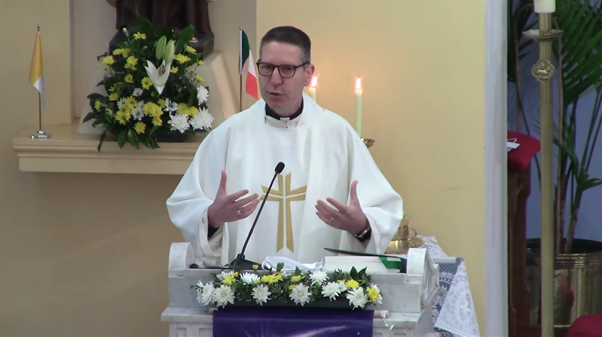
“Today, we are here to celebrate with Giacomo,” Fr Carl continued. “We are here to share his day of joy, but Giacomo, over the days, months, and years ahead, we will continue to be with you, to pray for you, to journey with you and to support you with all of our hearts.”
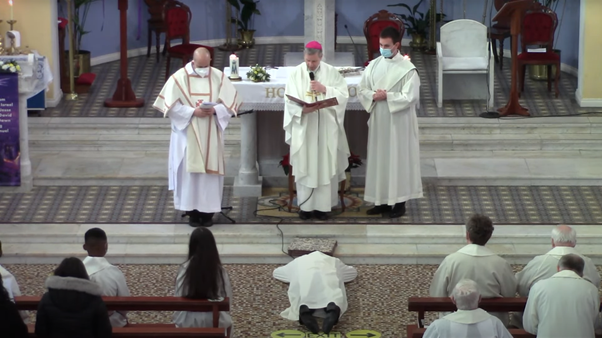
We join Bishop Fintan and Fr Carl in sending our heartfelt congratulations to the newly ordained Deacon Giacomo Gelardi MSC, and our prayers and blessings are with him as he continues on the path of his missionary journey.
Click here to watch the ordination to the Diaconate of Giacomo Gelardi MSC.
